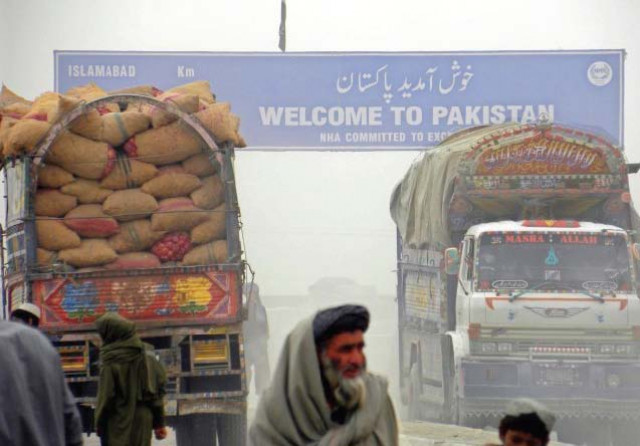Deadlock over interpretation puts Afghan trade on hold
Transit trade hit snags as differences emerged over the interpretation of the agreement.

A two-day meeting of the Afghanistan Pakistan transit trade coordination authority ended Saturday without achieving consensus on clauses pertaining to bank guarantees, international requirements for sealable trucks, biometric systems and installation of tracking systems.
All these points were used as bargaining chips by Pakistan against concerns of smuggling under the new Afghanistan Pakistan transit trade agreement (APTTA).
The differences on the interpretation of the important clauses indicate the pressure exerted on Islamabad by the United States to sign the deal in haste. The APTTA was pushed for by the US and its memorandum of understanding was inked in Washington about two years ago. Under the APTTA, Afghanistan has the right to import Indian goods through the sea route only.
“Unfortunately we could not agree on joint interpretation of some of the clauses and decided that operationlisation of the agreement was not possible on February 12th”, said secretary commerce Zafar Mahmood in a brief statement after the meeting.
He said the next meeting of the coordination authority would be held within six weeks and both the countries would make efforts to resolve issues.“The parties will also make efforts for a new operational date within four months”, said Mahmood who co-chaired the coordination authority meeting with the Afghan deputy commerce minister Mohammad Sharif Sharifi.
The authority has the responsibility to discuss any issue and work out the problems arising out of implementation.“The delegates tried their best to resolve these issues”, said Sharifi after the meeting.
According to insiders, the biggest stumbling block was the interpretation of the clauses relating to bank guarantees for trucks and customs security and financial guarantees. Pakistan has unilaterally interpreted this clause, which is not acceptable to the Afghan side … and the agreement cannot be reached”, said an official of the Afghan embassy on condition of anonymity.
The FBR has finalised the rules for APTTA but the notification is being put on hold as the Afghan side has certain reservations on the agreement. These articles pertain to freedom of transit and the commercial presence of Afghan trucks in Pakistan, raising questions on the very nature of the new agreement that would supersede the 1965 Afghanistan Transit Trade Agreement.
Afghanistan has also objected over a levy of 0.85 per cent of the customs values of the Afghan transit goods passing through Sindh.“This is an explicit contradiction of the 1965 agreement as well as the new APTTA agreement”, said the Afghan Embassy official.
Both the countries also could not make headway on the issue of installation of biometric system at the entry and the exit points of Afghan bound goods. Pakistan said that until the installation of the said system, the FIA will issue transit permits for a period of six months, with each stay for 15 days.
Both the sides could not agree on uniform demurrage charges and free days up to a month at all Pakistani ports. The parties also did not agree upon installation of compatible tracking devices on trucks to check dumping of the Afghanistan bound goods in the local markets.
Published in The Express Tribune, February 13th, 2011.



















COMMENTS
Comments are moderated and generally will be posted if they are on-topic and not abusive.
For more information, please see our Comments FAQ